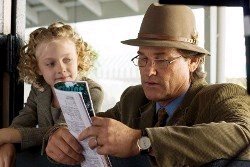
It’s a good article and shows why “preschool for all” probably won’t work. Every parent wants a different kind of environment for his or her child. And it makes sense because little kids all learn at different rates through different media and who knows a child better than his parents?
I’m not a big fan of Montessori because traditionally Montessori is a closed system of learning. I’m not a big fan of Waldorf because it’s limited. I’m not a big fan of accreditation. If your standards are so low you need to be accredited, then what’s the point? Accreditation is never for the children – it’s for the adults.
It’s a good idea to make a list of things you want in a preschool before you go shopping. Keep the list and use it as a six month test of excellence.
The ABCs of Picking the Right Preschool
By Sandra Diamond Fox
SPECIAL TO THE NEWS-TIMES
The News-Times/Michael Duffy
Spencer Abrams is only 2 and won’t start nursery school until the fall, but his parents are already looking at schools, trying to figure out which one is the best for their little boy.
Lisa and Barry Abrams, of Danbury, are smart to take their time in this search. Since Spencer is their first child, they’re not yet familiar with all of the different preschool programs which are offered. They know they have some research to do.
“We think this decision is very important and want Spencer to be well prepared for kindergarten,” said his mother, Lisa.
As they gather information, the Abrams will join other parents of toddlers in asking some essential questions. Among them are:
What kind of curriculum is best for my child?
How much parental involvement in the classroom would be ideal for me?
How much value should be placed on attending a school that is accredited?
How well will the school cater to my child’s individualized needs and situation?
The majority of children attend preschool these days. And while it’s a given that parents look for a warm, caring environment for their child’s first school experience, many have very specific ideas about other components needed to complete the picture.
Prior to having children, Michelle Doyle, of Danbury, taught preschool for more than 15 years. Consequently, she already had a clear idea of what she was looking for in a nursery school.
“I wanted a school that would assess my children’s needs and take them as high as they could go,” she said.
“There are so many schools these days that ‘teach to the masses,’ and I didn’t want this for my child,” said Doyle. Her daughter Katie, 4, attends the preschool program at St. Joseph Readiness Center in Danbury, where she is being challenged every day in all areas, said Doyle.
Carolyn Mandarano, of Danbury, said other preschool programs with a reputation for very high academic standards are those in Montessori-based schools. Mandarano, whose 4-year-old son Garrett is enrolled at The Hudson Country Montessori School in Danbury, said this school offers “a hands-on approach to learning where each child has his own individual curriculum.”
At Hudson Country, children ages 3 to 6 are in one classroom, so younger students get to learn from the older ones, explained Mandarano. The program is meeting the goals she and her husband set forth by creating an environment that’s designed to build children’s confidence, independence and skill development. Meanwhile the children are learning everything from mathematics and Spanish to drama, art, music, physical education, gymnastics, culture, science and practical life skills.
In this school year, Garrett has already learned to sound out the alphabet, read simple books, perform beginning arithmetic, and write his full name, Mandarano said proudly.
There are other parents who desire a nursery school program with a big emphasis on play, believing there is plenty of time for academics in later years. Andrea Nathans, a child psychologist in Danbury, says when her oldest son Benjamin was 4, she looked for something alternative for him.
Nathans strongly believed her son should be “in a wholesome environment” that nurtured “the innocence of childhood.”
She prefers a children’s program that’s “based on play, as well as one that allows them to express their creativity and imagination to the fullest.”
Nathans’ 3-year-old daughter, Alexandra, is currently enrolled in the nursery program at the Housatonic Valley Waldorf School in Newtown.
“The Waldorf philosophy really fits for my children,” said Nathans. “There’s a lot of reverence for nature and the rhythm of our lives that’s brought into the curriculum through songs, plays and puppet shows — as well as play with minimally processed materials.”
Regardless of what type of curriculum a school has, many parents view their involvement in the classroom as a top priority. For many children, this is the first time in their young lives that they are separated from their parents. Thus, parents want to know firsthand that their child is having a good experience.
While most programs encourage parents to help out periodically, one local nursery school takes parent participation a step further. This is King Street Nursery School, in Danbury.
Jennifer Matzner, parent of 4-year-old Joshua, who attends King Street Nursery, enthusiastically explained this is “a co-op whereby parents help out in the classroom on a rotating basis.” According to Matzner, every six weeks the parent of each student gets to work in the classroom, side by side with their child. “They can help out with various projects, work at the craft table, or even stay exclusively with their own child, if they prefer,” said Matzner.
Through this arrangement, not only does the parent get to spend quality time with their child, who greatly looks forward to these days, but they also get to know all the other children in the class. “I quickly learned who all my son’s friends are and ended up becoming friends with their parents as well,” said Matzner. “It feels like a family here.”
The accreditation question
Many parents base their final decision in selecting a nursery school upon whether or not it’s accredited by NAEYC (the National Association for the Education of Young Children). According to the NAEYC Web site, this association is dedicated to improving the well-being of all young children by providing them with high quality childhood education programs.
“A lot of schools advertise that they are accredited but really aren’t,” warned Doyle. “This is why it’s important for parents to ask the school this question directly. So many parents don’t do this and automatically assume their child’s school has accreditation, when it may not be the case.”
In addition, parents wishing to enroll their child in a Montessori-based school should ask the director whether the school is certified by the AMS (American Montessori Society), advised Doyle.
Still, other parents select a nursery school based on whether or not it can meet the needs of their unique family situation. Jessica Clifford of Danbury, mother to 3-year-old twins Emily and Audrey Clifford, was searching for a school that would treat her twins as individuals, while still allowing them to be in the same class.
“It’s hard when you have twins because sometimes people assume that just because they were born on the same day, that they are the same and that comparing them is perfectly acceptable,” said Clifford.
Bright Beginnings, in New Fairfield, proved to be a perfect fit for her. “Miss Tammy, my girls’ teacher, understands that they are complete opposites and knows how to work successfully with each one. As a parent of twins, this is important,” said Clifford.
Once Lisa and Barry Abrams choose a nursery school for Spencer, they’ll move forward and see how things go. If, for some reason they’re not completely satisfied Spencer is getting the optimal education they’re striving for, they can always pull him out and try another school.
No matter what school children attend, if parents take a genuine interest in the quality of education there, it will help foster a love of learning. That love of learning will impact children’s success throughout their school years and beyond.










